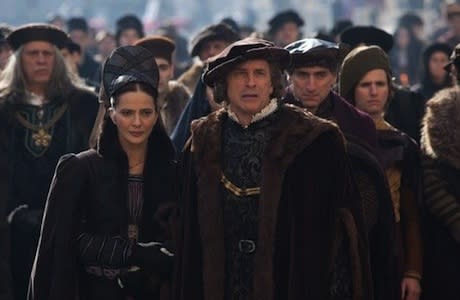Before Carlo Carlei's entirely redundant and painfully literal rendition of Shakespeare's Romeo and Juliet, a title card pops up, informing us that this bit of overacting and swoony melodrama comes courtesy of Swarovski Entertainment. Swarovski, for those outside of The View demographic, is a collection of tacky, superfluous charms, crystals, handbags, jewellery and even crystalline USB ports for middle-aged women with more money than sense. It's the very representation of middle-class rubbish bogging down economic progress, affirming superficial modes of identity performance and externalized validation for those with little internalized meaning or confidence.
Similarly, this overly twee, heavily scored rendition of cheap television costume drama is little more than artifice and endless preening. It features a high-calibre cast (Lesley Manville, Damian Lewis, Paul Giamatti and Stellan Skarsgård, to name a few) acting their hearts out recklessly, theatrically vying for attention at every creaking, uninspired turn.
Carlei (content to remain uninvolved in the exaggeratedly imbalanced nonsense happening in front of the camera — it genuinely feels like everyone is in a different movie, having a completely different interpretation of tone and character) adopts an out-dated Harlequin vision of the classic story. When Juliet (Hailee Steinfeld) is introduced, she's running through a castle in a white dress, leaping up a staircase with youthful whimsy, turning around (in slow motion, no less) to reveal a wide smile and (presumably) her budding beauty. It's not entirely dissimilar to an '80s perfume commercial, only cheaper looking and less deliberately sexualized.
This stylistic flatness, mixed with a very generalized, banal aesthetic, leaves the narrative unfolding without any sense of interpretation or cultural consciousness. Romeo (an astoundingly uncharismatic and discomforting Douglas Booth) pursues Juliet after growing tired of Rosalyn, exploiting her idealistic notions of romance when the inkling of an arranged marriage threatens to take away her quasi-independence. They make moony eyes at each other and indulge in teen hormones, being young and narcissistic enough to think that their love will transcend familial competition.
We all know how it ends and most will have some sort of facile grade school interpretation of the text as an admonitory for youthful indulgence or fatalistic recitation, which, despite vaguely highlighting the silliness of adolescent whimsy, Carlei doesn't attempt to change or even address. There's absolutely no intimacy or consistency amidst the many clumsily staged scenes, leaving any sense of emotional connectivity or engagement removed from the experience of viewing. The actors are all so wrapped up in their performances that they forget to react to, or engage with, each other, save Steinfeld and Manville (who plays her nurse), who make the most of their time on screen together.
Ostensibly, there's no reason for this version of Romeo & Juliet to exist; it adds nothing to the existing lexicon of Shakespeare adaptations and has little to say about the subject, merely going through the motions of superficial performance. Ironically, it reiterates the unspoken purposelessness of the Swarovski brand by being little more than mindless filler to milk a bit of cash from those inclined to parrot culture with little individual discernment.
(D Films)Similarly, this overly twee, heavily scored rendition of cheap television costume drama is little more than artifice and endless preening. It features a high-calibre cast (Lesley Manville, Damian Lewis, Paul Giamatti and Stellan Skarsgård, to name a few) acting their hearts out recklessly, theatrically vying for attention at every creaking, uninspired turn.
Carlei (content to remain uninvolved in the exaggeratedly imbalanced nonsense happening in front of the camera — it genuinely feels like everyone is in a different movie, having a completely different interpretation of tone and character) adopts an out-dated Harlequin vision of the classic story. When Juliet (Hailee Steinfeld) is introduced, she's running through a castle in a white dress, leaping up a staircase with youthful whimsy, turning around (in slow motion, no less) to reveal a wide smile and (presumably) her budding beauty. It's not entirely dissimilar to an '80s perfume commercial, only cheaper looking and less deliberately sexualized.
This stylistic flatness, mixed with a very generalized, banal aesthetic, leaves the narrative unfolding without any sense of interpretation or cultural consciousness. Romeo (an astoundingly uncharismatic and discomforting Douglas Booth) pursues Juliet after growing tired of Rosalyn, exploiting her idealistic notions of romance when the inkling of an arranged marriage threatens to take away her quasi-independence. They make moony eyes at each other and indulge in teen hormones, being young and narcissistic enough to think that their love will transcend familial competition.
We all know how it ends and most will have some sort of facile grade school interpretation of the text as an admonitory for youthful indulgence or fatalistic recitation, which, despite vaguely highlighting the silliness of adolescent whimsy, Carlei doesn't attempt to change or even address. There's absolutely no intimacy or consistency amidst the many clumsily staged scenes, leaving any sense of emotional connectivity or engagement removed from the experience of viewing. The actors are all so wrapped up in their performances that they forget to react to, or engage with, each other, save Steinfeld and Manville (who plays her nurse), who make the most of their time on screen together.
Ostensibly, there's no reason for this version of Romeo & Juliet to exist; it adds nothing to the existing lexicon of Shakespeare adaptations and has little to say about the subject, merely going through the motions of superficial performance. Ironically, it reiterates the unspoken purposelessness of the Swarovski brand by being little more than mindless filler to milk a bit of cash from those inclined to parrot culture with little individual discernment.
